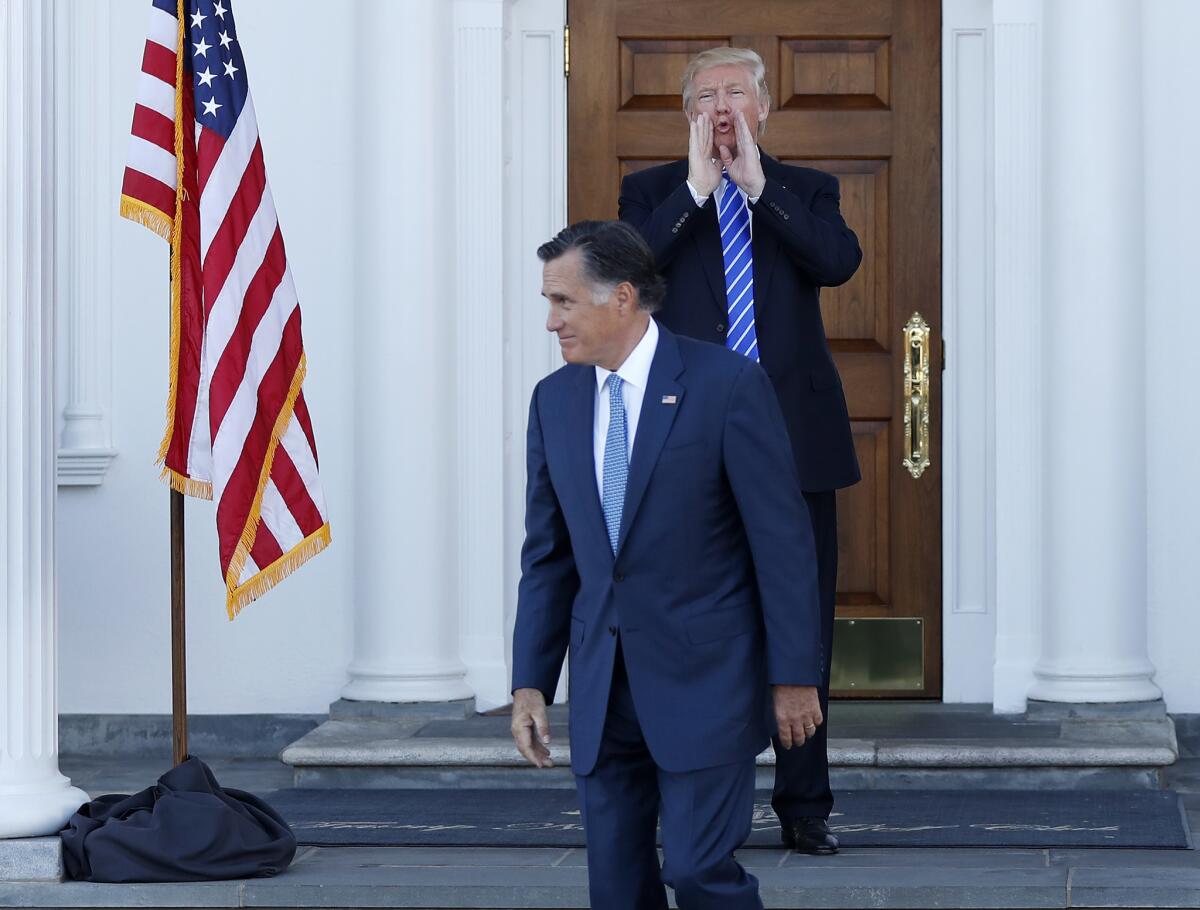How Pierre Delecto — sorry, Mitt Romney — is helping to save the republic

- Share via
WASHINGTON — Pierre Delecto might save the republic yet.
Ever since Mitt Romney was elected to the U.S. Senate a year ago, he wrestled with his scratchy, uncomfortable role as a NeverTrump Republican in Donald Trump’s Washington.
Even before he was sworn in, the senator from Utah published an op-ed decrying the president’s “shortfall” in character, but promising to work with him on policy.
“The president has not risen to the mantle of the office,” Romney fretted.
It got worse from there.
In a polarized, election-year Congress, Romney found few opportunities for the bipartisan legislating he‘d hoped to do.
Instead, he watched Trump’s presidency descend into crisis, with a chaotic White House, a special counsel’s report that left Romney “sickened” and investigations that barreled toward impeachment.
For months, the new senator said little. He tried to navigate a painfully narrow line between loyalty to his party’s conservative program and alarm at the president’s misrule. He set up a private Twitter account under a silly name, “Pierre Delecto,” to blow off steam, take covert shots at Trump allies and — even more foolishly — defend Sen. Mitt Romney.
But two events pushed Delecto — sorry, Romney — off his self-imposed edge.
One was Trump’s abrupt withdrawal of U.S. troops from northern Syria, an action Romney called “a bloodstain on the annals of American history.”
The other was the discovery that Trump had pressured Ukraine, an embattled recipient of U.S. military aid, to investigate Joe Biden and the Democratic Party.
Most Republicans found a hundred ways to excuse Trump’s well-documented demand of Ukraine’s president: “I would like you to do us a favor.”
Not Romney. To him, the conversation was “deeply troubling,” and Trump’s subsequent proposal that China should investigate Biden was “appalling.”
To Romney, the entire exchange appeared illegal, even before Tuesday’s testimony by former Ambassador William B. Taylor Jr. provided compelling evidence of a quid pro quo.
“We certainly can’t have presidents asking foreign countries to provide something of political value,” he told Axios reporter Mike Allen on HBO. “That is, after all, against the law.”
And that has led Romney to declare that he now considers himself a potential juror in Trump’s impeachment trial, with a duty to “make an assessment consistent with the law and the Constitution,” and that he hopes other GOP senators will join him in his increasingly vocal dissent.
“I do think people will view this as an inflection point in history,” he told McKay Coppins of the Atlantic. “I hope that what I’m doing will open the way for people to take a different path.”
That’s a dangerous thing to say. Until now, Trump and his defenders have succeeded in keeping all but a few Republicans unified behind defensive talking points: The charges are spurious. The investigation is partisan. Impeachment is (in Trump’s oxymoronic telling) “unconstitutional.”
Romney, the Republicans’ 2012 presidential nominee, has rejected those arguments. So, in a quieter and more tentative way, has a second GOP senator, Ben Sasse of Nebraska.
Equally important, they have — as Romney suggested — opened the way for more Republicans to break with the president. If a third, fourth and fifth senator dissent from the White House line, they will no longer be alone.
Trump instantly recognized the danger.
“Mitt Romney … is a pompous ‘ass’ who has been fighting me from the beginning,” the president tweeted.”#ImpeachMittRomney.” (A U.S. senator cannot be impeached.)
So what does Romney do now?
Naturally, he’s getting a shower of internet abuse from Trump supporters, who consider him a traitor to a cause he never endorsed — plus well-deserved ridicule for the invention of Pierre Delecto.
“It sounds like something from French Canadian soft-core porn,” said comedian Stephen Colbert.
He’s also been urged by other NeverTrumpers to do more: run for president, launch a third party, or, in a more practical vein, step into the shoes of the late Sen. John McCain as leader of dissenting Republicans in the Senate.
But Romney’s likely to disappoint anti-Trump enthusiasts again on all those counts. He’s said he has no interest in running for the Republican presidential nomination. He’s undertaken no steps toward forming a third party.
As for advancing himself as leader of a NeverTrump caucus, people who have talked with Romney say he isn’t actively lobbying his colleagues; he’s merely providing them a role model.
Unlike McCain, he’s a reluctant combatant, not an enthusiastic brawler. And after nine months, he’s still a rookie in the Senate.
There’s no sign of a grand strategy here. If Romney were executing a strategy, he would have killed off Pierre Delecto months ago. Instead, he tipped off Coppins to the clandestine avatar’s existence.
Still, even if Romney does little more than stick to his guns, he’s done something important: He’s made it safer for other Republicans to acknowledge that what Trump did in Ukraine was wrong and ought to be fully investigated.
OK, it was easier for Romney to take that leap than other GOP senators. He doesn’t face reelection until 2024. At 72, he says he doesn’t need more elections to consider his life well-lived. But there are older GOP senators, some already retiring, who haven’t managed to speak out at all.
Romney has taken an important step toward making Trump’s ever-more-likely impeachment legitimate — even, in some measure, bipartisan.
The current leaders of his party are in no mood to thank him. But Republicans in the future, once their party emerges from its Trump Era, may have reason to — long after Pierre Delecto has been forgotten by everyone but lovers of political trivia.
More to Read
Get the L.A. Times Politics newsletter
Deeply reported insights into legislation, politics and policy from Sacramento, Washington and beyond. In your inbox twice per week.
You may occasionally receive promotional content from the Los Angeles Times.











